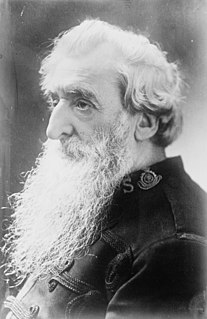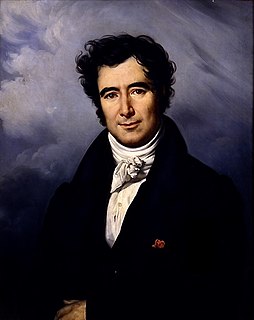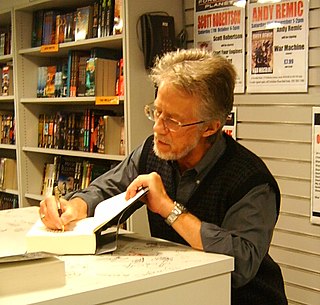Top 154 Fable Quotes & Sayings - Page 3
Explore popular Fable quotes.
Last updated on April 14, 2025.
The significance of our lives and our fragile planet is then determined only by our own wisdom and courage. We are the custodians of life's meaning. We long for a Parent to care for us, to forgive us our errors, to save us from our childish mistakes. But knowledge is preferable to ignorance. Better by far to embrace the hard truth than a reassuring fable. If we crave some cosmic purpose, then let us find ourselves a worthy goal.
I would by all means have men beware, lest Æsop's pretty fable of the fly that sate [sic] on the pole of a chariot at the Olympic races and said, 'What a dust do I raise,' be verified in them. For so it is that some small observation, and that disturbed sometimes by the instrument, sometimes by the eye, sometimes by the calculation, and which may be owing to some real change in the heaven, raises new heavens and new spheres and circles.
The myriad-minded man, our, and all men's, Shakespeare, has in this piece presented us with a legitimate farce in exactest consonance with the philosophical principles and character of farce, as distinguished from comedy and from entertainments. A proper farce is mainly distinguished from comedy by the licence allowed, and even required, in the fable, in order to produce strange and laughable situations. The story need not be probable, it is enough that it is possible.
The American public is a very specialized public. The reason it is taken as a realistic film is because inside the fable, I've put that kind of reality in. And it could easily be called, instead of Once Upon a Time in America, Once Upon a Time There Was a Certain Kind of Cinema. Because it was also an homage to cinema.
But as the work proceeded I was continually reminded of the fable about the elephant and the tortoise. Having constructed an elephant upon which the mathematical world could rest, I found the elephant tottering, and proceeded to construct a tortoise to keep the elephant from falling. But the tortoise was not more secure than the elephant, and after some twenty years of very arduous toil, I came to the conclusion that there was nothing more that I could do in the way of making mathematical knowledge indubitable.
Our country is the best country in the world. We are swimming in prosperity and our President is the best president in the world. We have larger apples and better cotton and faster and more beautiful machines. This makes us the greatest country in the world. Unemployment is a myth. Dissatisfaction is a fable. In preparatory school America is beautiful. It is the gem of the ocean and it is too bad. It is bad because people believe it all. Because they become indifferent. Because they marry and reproduce and vote and they know nothing.
So now, how did God produce this world?... The fable is that he breathed upon us. In his breath, his wind, came moisture and things began to grow... a message of hope. Nothing physical. How do you intend for your breath to become a work of art? The only way I can see it is that you prevent your breath from becoming a structure. As soon as your breath takes on the form of a room, you are a carpenter; you're not God.
Write every day, line by line, page by page, hour by hour. Do this despite fear. For above all else, beyond imagination and skill, what the world asks of you is courage, courage to risk rejection, ridicule and failure. As you follow the quest for stories told with meaning and beauty, study thoughtfully but write boldly. Then, like the hero of the fable, your dance will dazzle the world.
Jacqueline Carey has created a postmodern fable of enormous scope and force. Santa Olivia is at once a cautionary tale of people caught in a web of lies and creeping terror, and a love song to the beauty and power of being different. At the novel's heart is the kind of grace Carey is known for: an illumination of the strength that lies hidden inside all of us.
As though she had entered a fable, as though she were no more than words crawling along a dry page, or as though she were becoming that page itself, that surface on which her story would be written and across which there blew a hot and merciless wind, turning her body to papyrus, her skin to parchment, her soul to paper.
When you write a business fable, people get caught up in the story and don't get judgmental about what you're teaching them. If you're teaching a bunch of concepts, people get skeptical and say, 'Where'd you get that research?' But if you tell them a story, they get caught up in it while they learn.
The story of Romulus and Remus being suckled by a wolf is not a meaningless fable. The founders of every State which has risen to eminence have drawn their nourishment and vigor from a similar wild source. It was because the children of the Empire were not suckled by the wolf that they were conquered and displaced by the children of the Northern forests who were.
The profession of a prostitute is the only career in which the maximum income is paid to the newest apprentice. It is the one calling in which at the beginning the only exertion is that of self-indulgence; all the prizes are at the commencement. It is the ever-new embodiment of the old fable of the sale of the soul to the Devil. The tempter offers wealth, comfort, excitement, but in return the victim must sell her soul, nor does the other party forget to exact his due to the uttermost farthing.
An old Arabian fable tells of a prince imprisoned in a castle which had thirteen windows. Twelve of these windows overlooked lovely scenes, while the thirteenth looked down on the black ash heaps of the city. Ignoring the twelve windows, the prince always looked out through the thirteenth. It is so often true that whether a person carries with him an atmosphere of gloom and depression or one of confidence and courage depends on his individual outlook.
As to the fable that there are Antipodes, that is to say, men on the opposite side of the earth where the sun rises when it sets to us, men who walk with their feet opposite ours, that is on no ground credible. Even if some unknown landmass is there, and not just ocean, there was only one pair of original ancestors, and it is inconceivable that such distant regions should have been peopled by Adam's descendants.
Note, to-day, an instructive, curious spectacle and conflict. Science, (twin, in its fields, of Democracy in its)—Science, testing absolutely all thoughts, all works, has already burst well upon the world—a sun, mounting, most illuminating, most glorious—surely never again to set. But against it, deeply entrench'd, holding possession, yet remains, (not only through the churches and schools, but by imaginative literature, and unregenerate poetry,) the fossil theology of the mythic-materialistic, superstitious, untaught and credulous, fable-loving, primitive ages of humanity.
Surely all Americans have the right to give their money only to those causes which they support. But what kind of society has this created? A society where the ignorant reign. A society where enlightened must hold their tongues. A nation whose politicians must profess half-hearted devotion to an ancient fable or face the disastrous consequences of speaking their true mind.
Poetical taste is the only magician whose wand is not broken. No hand, except its own, can dissolve the fabric of beauty in which it dwells. Genii, unknown to Arabian fable, wait at the portal. Whatever is most precious from the loom or the mine of fancy is poured at its feet. Love, purified by contemplation, visits and cheers it; unseen musicians are heard in the dark; it is Psyche in the palace of Cupid.
Doth some one say that there be gods above? There are not; no, there are not. Let no fool, Led by the old false fable, thus deceive you. Look at the facts themselves, yielding my words, No undue credence: for I say that kings kill, rob, break oaths, lay cities waste by fraud, And doing thus are happier than those, Who live calm pious lives day after day. All divinity is built-up from our good and evil luck.
Is it the lumberman, then, who is the friend and lover of the pine, stands nearest to it, and understands its nature best? Is it the tanner who has barked it, or he who has boxed it for turpentine, whom posterity will fable to have been changed into a pine at last? No! no! it is the poet: he it is who makes the truest use of the pine-who does not fondle it with an axe, nor tickle it with a saw, nor stroke it with a plane. . . .
Through humility, soul-searching, and prayerful contemplation we have gained a new understanding of certain dogmas. The church no longer believes in a literal hell where people suffer. This doctrine is incompatible with the infinite love of God. God is not a judge but a friend and a lover of humanity. God seeks not to condemn but only to embrace. Like the fable of Adam and Eve, we see hell as a literary device. Hell is merely a metaphor for the isolated soul, which like all souls ultimately will be united in love with God.
Rivers are inherently interesting. They mold landscapes, create fertile deltas, provide trade routes, a source for food and water; a place to wash and play; civilizations emerged next to rivers in China, India, Europe, Africa and the Middle East. They sustain life and bring death and destruction. They are ferocious at times; gentle at times. They are placid and mean. They trigger conflict and delineate boundaries. Rivers are the stuff of metaphor and fable, painting and poetry. Rivers unite and divide - a thread that runs from source to exhausted release.
There is, in fact, not much point in writing a novel unless you can show the possibility of moral transformation, or an increase in wisdom, operating in your chief character or characters. Even trashy bestsellers show people changing. When a fictional work fails to show change, when it merely indicates that human character is set, stony, unregenerable, then you are out of field of the novel and into that of the fable or the allegory. - from the introduction of the 1986 Norton edition
I have come to know that adversity really means the things in life that challenge us and cause us to work with devotion and courage to overcome. I once stood on a street in Trondheim, Norway, looking up at a statue of a Viking. There came to my mind at that time a fable of the Norsemen that when a man won a victory over another, the strength of the conquered went over into his veins. Therefore, in this sense adversity is good, for it produces in us a source of strength as we learn to conquer our weaknesses.
The ancients had a taste, let us say rather a passion, for the marvellous, which caused grouping together the lofty deeds of a great number of heroes, whose names they have not even deigned to preserve, and investing the single personage of Hercules with them. In our own time the public delight in blending fable with history. In every career of life, in the pursuit of science especially, they enjoy a pleasure in creating Herculeses.
All that remains is a fate whose outcome alone is fatal. Outside of that single fatality of death, everything, joy or happiness, is liberty. A world remains of which man is the sole master. What bound him was the illusion of another world. The outcome of his thought, ceasing to be renunciatory, flowers in images. It frolics-\-\-in myths, to be sure, but myths with no other depth than that of human suffering and, like it, inexhaustible. Not the divine fable that amuses and blinds, but the terrestrial face, gesture, and drama in which are summed up a difficult wisdom and an ephemeral passion.
I hate symbolic art in which the presentation loses all spontaneous movement in order to become a machine, an allegory -- a vain and misconceived effort because the very fact of giving an allegorical sense to a presentation clearly shows that we have to do with a fable which by itself has no truth either fantastic or direct; it was made for the demonstration of some moral truth.
The fable of Christ and his twelve apostles is a parody of the sun and the twelve signs of the Zodiac, copied from the ancient religions of the Eastern world. Every thing told of Christ has reference to the sun. His reported resurrection is at sunrise, and that on the first day of the week; that is, on the day anciently dedicated to the sun, and from thence called Sunday.
My work is very eclectic. I write books that range from writing fiction, writing fable where I am very directly trying to imagine alternate worlds, to writing about [Buckminster] Fuller who was the ultimate world man creating all sorts of alternate worlds and believing that they were imminent to my own work of - for instance, a project that I've been working on for some year and a half, two years now that continues to evolve has been what I call Deep Time Photography.
The story of Terisa and Geraden began very much like a fable. She was a princess in a high tower. He was a hero come to rescue her. She was the only daughter of wealth and power. He was the seventh son of the lord of the seventh Care. She was beautiful from the auburn hair that crowned her head to the tips of her white toes. He was handsome and courageous. She was held prisoner by enchantment. He was a fearless breaker of enchantments. As in all the fables, they were made for each other.
It is interesting to observe with what singular unanimity the farthest sundered nations and generations consent to give completeness and roundness to an ancient fable, of which they indistinctly appreciate the beauty or the truth. By a faint and dream-like effort, though it be only by the vote of a scientific body, the dullest posterity slowly add some trait to the mythus. As when astronomers call the lately discovered planet Neptune; or the asteroid Astr
There are, after all, atheists who say they wish the fable were true but are unable to suspend the requisite disbelief, or who have relinquished belief only with regret. To this I reply: who wishes that there was a permanent, unalterable celestial despotism that subjected us to continual surveillance and could convict us of thought-crime, and who regarded us as its private property even after we died? How happy we ought to be, at the reflection that there exists not a shred of respectable evidence to support such a horrible hypothesis.






























